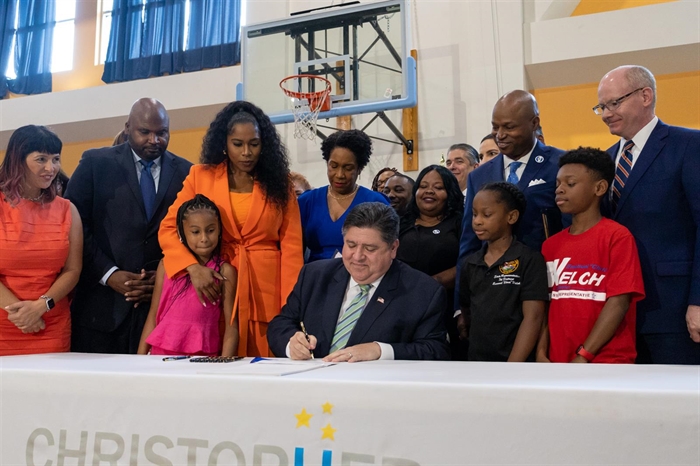Pritzker puts final stamp on $50.4 billion state spending plan

CHICAGO – Gov. JB Pritzker signed the state’s operating budget for the upcoming fiscal year on Wednesday, marking the first spending plan of his second term as governor.
The $50.4 billion spending plan anticipates about $50.6 billion in revenues for the fiscal year that begins July 1, making for a projected surplus of roughly $183 million, according to the governor’s office. That revenue estimate would be slightly below or roughly equal to what’s collected in tax revenues for the current year, depending on June’s final revenue collections.
The bill signing’s venue, typically chosen to highlight an important aspect of the budget, was the Belmont Cragin campus of Christopher House in Chicago, a charter school that mostly serves low-income Hispanic families.
The signing was attended by a who’s who of state Democrats, with the governor, House Speaker Emanuel “Chris” Welch, D-Hillside, Senate President Don Harmon, D-Oak Park, and various members of the legislature’s Democratic leadership and budget negotiation teams.
Several of them highlighted the budget’s investments in education.
“Birth-to-five services and kindergarten readiness are the foundation for the rest of our children’s educational experiences,” Pritzker said.

The budget includes funding to launch Pritzker’s “Smart Start Illinois” early childhood education program. Earlier this year, he toured the state to promote the increased spending on pre-K and kindergarten, which includes $130 million to fund a new system of contracts for early childhood workers and upping state funding for early childhood block grants by $75 million. “Smart Start” also includes added funding for early intervention and home visiting programming.
The budget also increases state dollars going to the K-12 funding formula by $350 million – the amount called for annually in state law – and puts $45 million toward a three-year pilot program to fill teacher vacancies and provide scholarships to future teachers. It’s less than the $70 million for that program that Pritzker included in his February budget proposal.
Higher education, a long-time budget priority of Pritzker’s, will also see increased funding. These include a $100 million funding increase to the state’s Monetary Award Program, which provides need-based scholarships. It marks a 75 percent increase in funding for MAP grants since 2019. The budget also includes a $15 million increase to the AIM HIGH merit-based scholarship program and a $3.8 million increase to the Minority Teacher Scholarship program.
Despite praising Republican involvement in budget negotiations throughout the legislative session, Senate Minority Leader John Curran, R-Downers Grove, criticized the overall budget in a Wednesday statement while noting it included some common ground between the two parties.
“We negotiated in good faith, and as a result, there are some joint priorities in this budget, specifically to support the developmentally disabled and invest in education,” Curran said.
No Republicans in either chamber voted for the plan.
In the House, debate was more tense. Republican budget negotiator Norine Hammond, of Macomb, said the GOP was essentially cut out from the budget process by House Democrats. She had previously noted Republicans participated in more frequent budget talks with the governor’s staff.
“Another budget filled with broken promises, accounting gimmicks, and a lack of structural reforms to address the systemic outmigration of Illinois families,” House Republican Leader Tony McCombie, R-Savanna, said in a Wednesday statement.
McCombie also contradicted Curran’s read of the budget and said that it “shortchanges” the direct service professionals, or DSPs, that serve disabled people in community settings.
A state-commissioned 2020 study of the industry recommended increasing DSP wages to 150 percent of the state’s minimum wage, which is currently $13 per hour and is set to increase to $14 in January.
The budget includes provisions increasing DSP wage base rates by $2.50 per hour, to $19.50, beginning in January. That would still fall short of the $4 per hour needed to meet the study’s recommendation as of next year. Still, it marks a $1 increase beyond what Pritzker had proposed in February.
Home workers who assist the elderly are also slated to receive a rate increase of $24 million.
The budget also includes $75 million for the Department of Children and Family Services. Pritzker’s office said this is expected to pay for 192 staff positions, expanded training, facility improvements and scholarships to children in DCFS care.
Services aimed at preventing homelessness are set to receive an increase of $85 million through the Home Illinois program, a multi-agency initiative that will provide housing and services to homeless people.
The more than $350 million in funding includes $118 million for shelter and transitional housing services, $50 million for rapid rehousing services, $40 million in capital funds for permanent supportive housing units and $37 million in funds to build new shelter units.
While Republicans have been critical of the budget, the House’s lead budget negotiator, Rep. Jehan Gordon-Booth, D-Peoria, said compromise was an essential part of the process.
“The budget is a reflection of our priorities,” she said. “It’s a reflection of everybody getting wins, but nobody got everything.”

Earlier this week, Pritzker noted the budget would exempt businesses from the first $5,000 in liability under the corporate franchise tax, up from $1,000. He called it a $50 million tax cut that addressed at least one Republican budget priority. Pritzker and leaders in the General Assembly negotiated a phaseout of that tax in his only bipartisan budget passed in 2019, but Democrats ultimately reversed that action in a future budget year.
During debate last month, Republicans in both chambers were also sharply critical of the budget because it allowed for the expiration of the $75 million Invest in Kids scholarship program for private school students. The program initially passed as part of a bipartisan agreement in 2017 with support from the school-choice movement and Republican lawmakers.
When asked on Wednesday, Pritzker said the conversation around funding that program is “ongoing,” and “there’s time still for that program to be considered,” potentially in the fall veto session, before its Jan. 1, 2024, expiration.
Democrats on Wednesday also alluded on several occasions to a two-year budget stalemate between Republican then-Gov. Bruce Rauner and Democrats in the legislature that lasted from July 2015 into August 2017. During that time, the state did not approve a full budget, causing havoc in education and the social services industry, both of which rely heavily on state funding.
“It’s no longer about how to keep the doors open and scrape by,” Lt. Gov. Juliana Stratton said of the budget process.
At the bill signing, Pritzker also addressed a state-funded health care program for noncitizens, which his administration at one time projected would cost over $1 billion in the upcoming fiscal year.
The program offers Medicaid-style benefits to noncitizens age 42 and older who would otherwise be eligible for Medicaid if not for their legal residency status. It was launched in 2021 and expanded twice to its current size. Because the individuals enrolled in the program are not eligible for standard Medicaid, which is jointly funded by the state and federal governments, Illinois covers its entire cost.

A separate Medicaid-related bill, which Pritzker has not yet signed, will give him authority to rein in costs through the creation of administrative rules. His office has said options include limiting future enrollment, requiring copays from program participants, maximizing federal reimbursement and possibly moving participants to the Medicaid managed care system.
Pritzker noted that the program does not apply to asylum seekers, who are eligible for other federally funded benefits. He also said it is ultimately cheaper to provide preventative care to noncitizens rather than making them rely on emergency room visits to treat conditions that have gone undiagnosed and untreated due to a lack of health care benefits.
Pritzker’s February budget proposal accounted for about $220 million in costs for the program, and the final budget did not include a measure sought by the Illinois Legislative Latino Caucus that would have expanded it to noncitizens aged 19 and over. Those 18 years and younger are already covered under the Illinois AllKids program.
“We realized that if we could manage it properly, we could manage the program with the number of people that are in it now to about $550 million,” Pritzker said Wednesday. “That’s more than we expected, but not nearly as much as it might have cost if we didn’t have the tools necessary.”
The governor’s office did not clarify whether that meant the program would be capped at current levels or if more people would be allowed to enroll in the upcoming fiscal year.
“We’ll have more on what steps we’ll need to take as we enter the new fiscal year and review costs,” a spokesperson said in a statement.
Pritzker’s signing included one change to the budget as it was approved by lawmakers last month. Lawmakers, agency directors and others in state government who would have received raises of 5.5 percent under an automatic pay formula will be capped at 5 percent to comply with state law.
“It is evident that the errors in the amounts to compensate all of these officers were inadvertent and that the General Assembly intended for the amounts set forth in Senate Bill 250 simply to implement the salaries provided by law,” Pritzker said in his “reduction veto” message.
Under law, lawmakers do not need to accept the reduction, so the budget can take effect without issue.
Miss Clipping Out Stories to Save for Later?
Click the Purchase Story button below to order a print of this story. We will print it for you on matte photo paper to keep forever.

